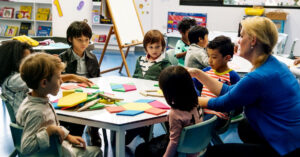Reimagining Education: A Guide to Microschools

The traditional one-size-fits-all approach to education is no longer the only option. Parents are increasingly seeking innovative alternatives that cater to their children’s unique needs and learning styles. This is where microschools enter the picture, offering a refreshing approach to education.
A microschool is a deliberately small learning environment, typically with class sizes ranging from a handful to several dozen students. Imagine a one-room schoolhouse reimagined for the 21st century! Microschools often operate outside of the traditional school system and can be registered with the state as homeschooling operations.
Key Characteristics of Microschools:
- Personalized Learning: Microschools prioritize understanding each child’s strengths, weaknesses, and learning styles. This allows for customized learning plans that cater to individual needs.
- Focus on Play-Based Learning: Many microschools incorporate project-based learning and hands-on activities into their curriculum. Students collaborate on real-world projects, fostering critical thinking, problem-solving, and teamwork skills. Play is also a central element, encouraging exploration and a love of learning.
- Strong Community Focus: Microschools often foster a strong sense of community through family events and service-learning opportunities. This collaborative approach allows children to connect with peers, build relationships, and contribute to the world around them.
Benefits of Attending a Microschool:
- Individualized Attention: Children receive personalized support and can thrive at their own pace.
- Development of Essential Skills: Microschools go beyond academics, fostering critical thinking, creativity, collaboration, and communication skills.
- Nurturing Curiosity: The emphasis on exploration and hands-on learning ignites a lifelong love of learning in children.
- Strong Community: Micro Schools offer a supportive and nurturing environment where children feel a sense of belonging.
- Your Child’s Learning Style: Microschools cater to diverse learning styles, from kinesthetic to auditory learners.
- Your Educational Goals: Do you prioritize personalized learning, project-based learning, or a strong focus on social-emotional development?
- School Environment: Consider the location, class sizes, and overall philosophy of the microschool.
Exploring the Educational Landscape: A World of Possibilities
Microschools offer a compelling alternative to traditional education. These innovative learning environments empower students to become independent learners, critical thinkers, and problem solvers. By considering the unique offerings of microschools, you can choose the educational environment that best nurtures your child’s potential and sets them on a path to lifelong success.
Let's Talk
Share this Articles




